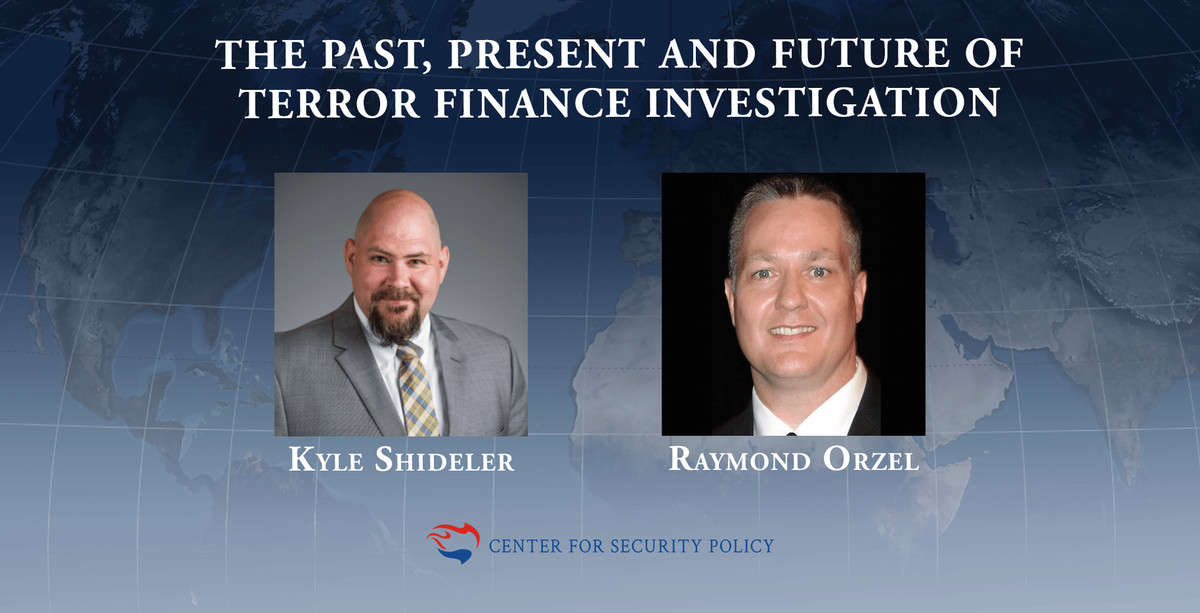Webinar: Countering Terrorism Finance Requires Cooperation, Avoiding Politicization

The U.S. government has made great strides in working with regional allies to counter terrorism finance says a former U.S. government counterterrorism expert. But politicization –both domestic and foreign—can interfere with efforts by investigators to expose terrorists and their finance schemes.
That was the message of Raymond Orzel, who served as inaugural Director and Executive Co-Chair of the Terrorist Financing Targeting Center (TFTC) and is now a senior fellow at the Center for Security Policy.
Orzel was speaking with Center Senior Analyst for Homeland Security and Counterterrorism Kyle Shideler at a webinar on the “Past, Present, and Future of Terror Finance Investigations” on April 7th.
Orzel discussed his time leading with the TFTC, which was co-chaired between the U.S. and Saudi Arabia, and the efforts at establishing cooperation with multiple Gulf States on terror finance. He noted that several gulf states had made significant strides in combating terror finance compared to the immediate aftermath of the 9/11 terror attacks. Orzel explained:
When I became the executive director of the [TFTC], not only had the Saudis already established that financial intelligence unit, but they also had done a lot more. Including a hard push for the establishment of the [TFTC] itself. They were co-chairs of that… I can say just from personal experience they have been active participants, willing participants, and to their credit they have made great strides in countering terrorism.
He expressed concern regarding the decision of the Biden Administration to roll back sanctions against the Houthi rebels and warned that escalating Houthi strikes could impact not just Saudi Arabia but also U.S. diplomats, contractors as well as the personnel of U.S. allies stationed in the country Orzel noted:
What’s unfortunate about delisting the Houthis is -while I was in Riyadh, and my wife was with me, the Houthis were lodging missile attacks as far into Saudi Arabia as the diplomatic quarter in Riyadh… by relaxing sanctions against the Houthis, the question comes up: Is Iran going to become more assertive through their proxy, the Houthis?
Orzel also warned against the politicization of terror finance sanctions, expressing concern at the possibility of the Biden administration alleviating terror finance sanctions to further nuclear negotiations with Iran. Orzel called the decision to delist the Houthis “premature,” adding “All indications from Iran are that is that they are not going to negotiate, they’re not going to give up on their enrichment of uranium.”
Orzel also addressed the decision by Saudi Arabia and the United Arab Emirates to designate Muslim Brotherhood organizations as terrorist groups. Orzel said foreign countries aggressively designating Brotherhood groups is “absolutely” helpful.
“It does make a difference. If you had any one of the members of the TFTC, if they were more forward-leaning on certain subject entities or individuals then that would certainly help the process… and it does have an impact or influence on U.S. decision, but it is not always the ultimate or final decision piece.”
Orzel, who was involved in the U.S. Treasury Department’s “Operation Greenquest” investigation which exposed U.S. Muslim Brotherhood groups in financing terrorism said he had “not seen evidence” of a change in behavior from Muslim Brotherhood organizations when it comes to financing terrorism.
Orzel noted the importance of understanding the role of “fungibility” when examining Brotherhood financing. He brought up the role of the Holy Land Foundation, the largest Islamic charity at the time of its conviction in 2008 for financing Hamas.
“Essentially what you had was reverse money laundering,” Orzel explained. “You had “good” money going through mosques and charitable organizations towards illicit purposes, terrorism and other activities.”
Because money is a fungible resource, funds provided to terrorist organizations to conduct social or political activities “frees up” a terrorist group to spend money it raised from other sources on violence or criminal activity. Shideler noted that a number of U.S. charities and political pressure groups have weakened government emphasis on ‘fungibility” as a legal concept. Orzel concurred, noting the impact of political pressure.
“Certain investigations that I was a part of, with changes in administrations and changes in views on the work we were doing…there’s that political pressure. And then you have charitable organizations that become very proactive in lobbying Congress. CAIR, the Council on American Islamic Relations, to their credit they have lobbied Congress very effectively and they have gotten the attention of members of Congress.”
CAIR was identified by the FBI during the Holy Land Foundation case as one of several U.S. Muslim Brotherhood organizations founded to support Hamas.
Orzel said he does believe that law enforcement and intelligence efforts to target the use and abuse of charities by terrorists has had a positive impact—but warned against the risk of politicization and interagency conflict. Orzel noted:
When you allow political ideology to step into the fray, then you’ve taken away the independence and objectivity of law enforcement agents and intelligence officers. All special agents in the government… you are fact finders. That is it. You do not make prejudgments… you have to let the evidence speak for itself.
Orzel also warned that terrorism finance mechanisms are “always evolving,” noting the rise of crypto-currency, exploiting resource-extraction at captured gold and oil production facilities, drug and product smuggling, and in engaging in other forms of illicit financing.
- Anarchists call for solidifying gains, expanding violent insurgency - February 5, 2026
- Shideler: Resistance to Immigration Enforcement Is Fierce in Minnesota - February 2, 2026
- The Revolution Is On in Minnesota - January 26, 2026
